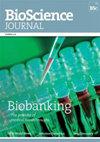Insecticidal potential of organic extracts of Calotropis procera to Spodoptera frugiperda
IF 0.6
4区 农林科学
Q3 AGRICULTURE, MULTIDISCIPLINARY
引用次数: 0
Abstract
This study evaluated the toxic effects of organic extracts of Calotropis procera leaves on the survival, development, and reproduction of Spodoptera frugiperda. Solutions of crude methanol extract and hexane and methanol fractions of C. procera leaves were added at 1.15% and 2.14% concentrations to the artificial diet of S. frugiperda. The mortality and duration of larval and pupal phases, weights of female and male pupae, deformations of pupae and adults, the reduction of adults able to reproduce, pre-oviposition and oviposition periods, the number of postures per female, and the fecundity and fertility of S. frugiperda females were also evaluated. The extracts harmed the survival, development, and reproduction of S. frugiperda. The ingestion of extracts and fractions by caterpillars affected adults by decreasing the oviposition period, the number of postures, fecundity, and fertility. The crude MeOH extract at a 2.14% concentration harmed the evaluated parameters of the insect, except for pupal mortality, female pupae weight, and pre-oviposition period. The MeOH fraction at 2.14% caused a 50.0% mortality of caterpillars and 16.0% deformation in pupae and 33.0% in adults, reducing by 72.0% the population able to reproduce. The MeOH fraction at the 2.14% concentration caused 25.0% and 38.0% of pupal mortality and deformation, respectively. Calotropis procera has promising insecticidal properties for a biological insecticide, a convenient and sustainable strategy for protecting plants against S. frugiperda.纹夜蛾有机提取物对草地贪夜蛾的杀虫潜力
本研究评价了纹夜蛾叶片有机提取物对草地贪夜蛾生存、发育和繁殖的毒性作用。将粗甲醇提取物和C.procera叶的己烷和甲醇馏分的溶液以1.15%和2.14%的浓度添加到S.frugiperda的人工日粮中。还评估了幼虫期和蛹期的死亡率和持续时间、雌蛹和雄蛹的重量、蛹和成虫的变形、成虫繁殖能力的减少、产卵前和产卵期、每只雌蛛的姿势数量以及草地贪夜蛾雌蛛的繁殖力和育性。这些提取物危害了草地贪夜蛾的生存、发育和繁殖。毛虫摄入提取物和组分会降低产卵期、姿势数量、繁殖力和生育能力,从而影响成虫。2.14%浓度的甲醇粗提物损害了昆虫的评估参数,但蛹死亡率、雌蛹重量和产卵前期除外。2.14%的甲醇组分导致毛毛虫50.0%的死亡率,蛹16.0%的变形,成虫33.0%的变形,使能够繁殖的种群减少72.0%。2.14%浓度的甲醇组分分别导致25.0%和38.0%的蛹死亡和变形。Caltrophis procera作为一种生物杀虫剂具有很好的杀虫性能,是一种方便和可持续的保护植物免受草地贪腐病侵害的策略。
本文章由计算机程序翻译,如有差异,请以英文原文为准。
求助全文
约1分钟内获得全文
求助全文
来源期刊

Bioscience Journal
Agricultural and Biological Sciences-General Agricultural and Biological Sciences
CiteScore
1.00
自引率
0.00%
发文量
90
审稿时长
48 weeks
期刊介绍:
The Bioscience Journal is an interdisciplinary electronic journal that publishes scientific articles in the areas of Agricultural Sciences, Biological Sciences and Health Sciences. Its mission is to disseminate new knowledge while contributing to the development of science in the country and in the world. The journal is published in a continuous flow, in English. The opinions and concepts expressed in the published articles are the sole responsibility of their authors.
 求助内容:
求助内容: 应助结果提醒方式:
应助结果提醒方式:


